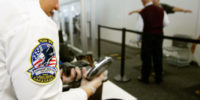The Canadian Security and Intelligence Service’s use of publicly available geolocation data without a warrant may have broken the law, according to the country’s intelligence watchdog. The finding was included in the first annual report from the new National Security and Intelligence Review Agency, tabled in the House of Commons today. Geolocation data is digital information that can be used to determine the physical location of an electronic device. The review found that there’s a risk that CSIS breached Section 8 of the Charter — which protects against unreasonable search…
Read MoreTag: Warrant
TSA Accused Of Searching Domestic Travelers’ Devices With No Warrant | Ars Technica
This lawsuit, which is meant to compel the TSA to fully respond to a Freedom of Information Act request, is related to another lawsuit (Alasaad v. Duke) brought by the ACLU to better understand such searches that happen when Americans return home from abroad. “The federal government’s policies on searching the phones, laptops, and tablets of domestic air passengers remain shrouded in secrecy,” said Vasudha Talla, staff attorney with the ACLU Foundation of Northern California, in a Monday statement. The advocacy group filed a FOIA request on December 20, 2017,…
Read MoreSpies More Free To Use Cellphone Surveillance Tech Without Warrant, Under Court Ruling – Technology & Science – CBC News
A federal court judge has ruled that Canada’s domestic spy agency can continue to use contentious cellphone surveillance devices without a warrant, in some cases. For several years, the Canadian Security Intelligence Service (CSIS) has used a device it calls a Cell Site Simulator (CSS) to collect information about cellphones and other cellular-capable devices — such as some laptops or tablets — during its national security investigations. The devices are perhaps better known as IMSI Catchers or Stingrays, and pretend to be legitimate cellphone towers in order to collect information. Privacy…
Read More

